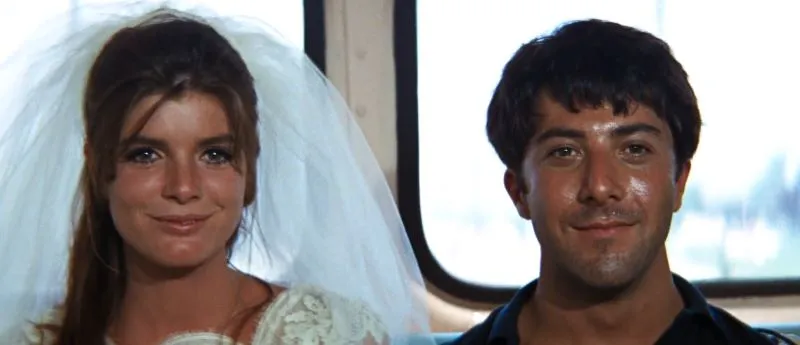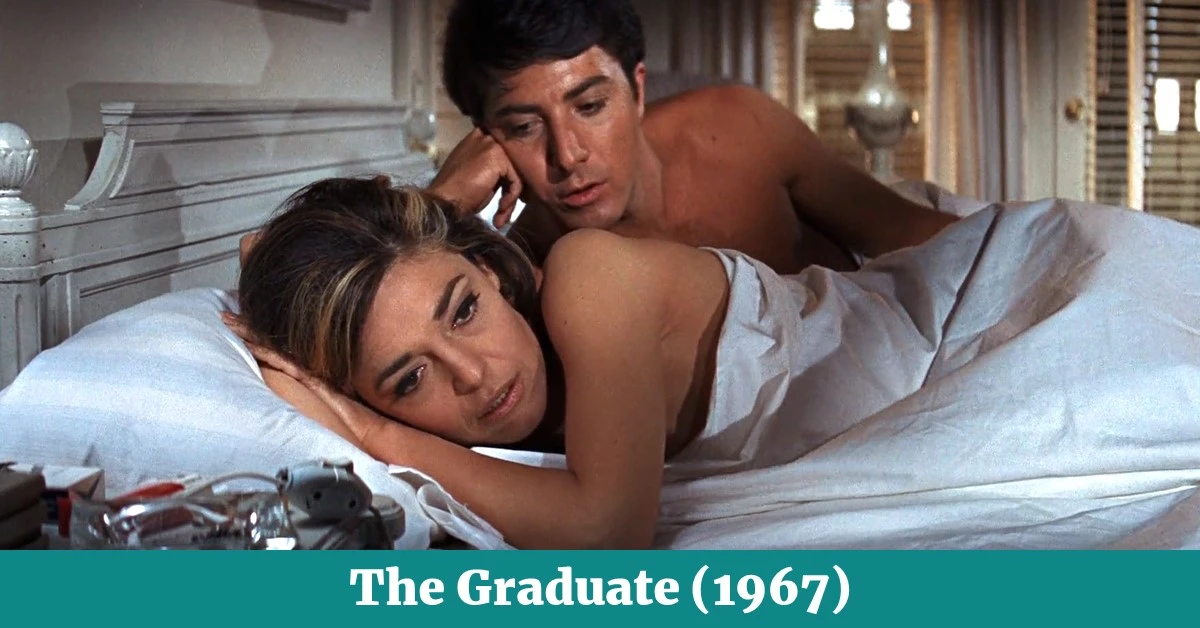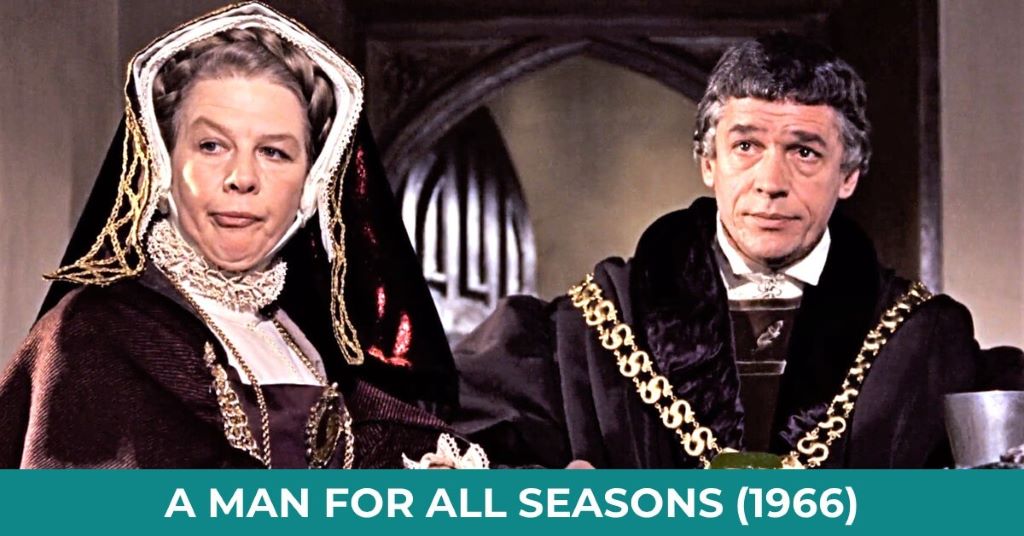The Graduate 1967 is a romantic classic drama film directed by Mike Nicholas.
The film is based on the 1963 novel by Charles Webb of the same name which is the story of a 21-year-old newly graduated, Benjamin Braddock and his father’s law partner’s middle-aged wife Mrs Robinson who seduced him into an illicit affair. The Graduate is one of the 101 best films of 100 years on my list.
The Graduate is among the highest-grossing films in the USA and Canada, winning 18 awards, including one Academy Award as Best Picture and the 17th film of the American Film Institute’s 100 best films.
Benjamin (played by Dustin Hoffman) becomes increasingly disillusioned with his aimless existence and the expectations placed upon him by his parents and society. The affair with Mrs. Robinson (played by Anne Bancroft) provides a temporary distraction, but it also deepens his existential crisis.
When Benjamin finally gives in the temptation of Mrs Robinson, Benjamin feels the pressure from his parents to date Elaine, the daughter of who he had been bedding. Remotely, related though, it reminds of the biblical story of Potiphar’s seduction towards Joseph, one of Jacob’s sons and its real-life implication.
In the 1967 film The Graduate, the illicit relationship between Ben Braddock and Mrs. Robinson is a central and provocative element of the story. Mrs. Robinson, a middle-aged woman, seduces the young and recently graduated Ben, leading to an affair that is both shocking and scandalous given the social norms of the time.
This seduction is driven by Mrs. Robinson’s own disillusionment and dissatisfaction with her life, and it represents a significant moral and emotional conflict for Ben, who is initially reluctant but eventually succumbs to her advances. The affair complicates Ben’s life and creates tension, especially when he later falls in love with Mrs. Robinson’s daughter, Elaine.
This narrative of carnal temptation and illicit relationships draws a parallel to the biblical story of Joseph and Potiphar’s wife. In this story, found in the Book of Genesis, Joseph is a handsome and capable young man who becomes the steward of Potiphar, an officer of Pharaoh. Potiphar’s wife becomes infatuated with Joseph and repeatedly attempts to seduce him. Despite her persistent advances, Joseph consistently rejects her, citing his loyalty to Potiphar and his moral integrity.
Eventually, when Joseph firmly resists her final attempt, she falsely accuses him of trying to assault her, leading to Joseph’s imprisonment.
The similarities between these two stories include:
- Age and Power Subtleties: In both narratives, an older, more powerful individual (Mrs. Robinson and Potiphar’s wife) attempts to seduce a younger person (Ben and Joseph). The power imbalance is a crucial element in both stories, adding to the tension and complexity of the relationships.
- Illicit Temptation: Both Ben and Joseph face significant carnal temptation. While Ben eventually gives in to Mrs. Robinson’s seduction, Joseph resists Potiphar’s wife, highlighting different responses to similar temptations.
- Moral Conflict: The characters experience profound moral dilemmas. Ben struggles with his affair’s ethical implications, especially considering his relationship with Elaine. Joseph’s resistance is grounded in his strong moral convictions and loyalty, which ultimately leads to his unjust punishment.
- Consequences: Both stories illustrate the significant consequences of succumbing to or resisting temptation. Ben’s affair leads to personal turmoil and complicated relationships, whereas Joseph’s resistance results in false accusations and imprisonment, but ultimately leads to his rise to power and reconciliation.
The exploration of these themes in The Graduate and the biblical story of Joseph and Potiphar’s wife underscores the timeless nature of moral and ethical challenges related to carnal temptation, power dynamics, and the consequences of our choices.
The Graduate film review
One of the most important elements, it seemed to me, was The Graduate’s ability to provide educative content and the consequences of undue relations. The message is powerful in every way.
For The Graduate is above all the film about the young that mums and dads would like to see.
Except that the old Hays Office would have taken a dim view of one or two of its happenings, it could, as far as its views of young people are concerned, have been made back in the days of Andy Hardy.
Its hero, just graduated summa cum laude or with highest distinction, is uncertain (which is right and proper for youth), but not the teeniest bit rebellious or anything nasty like that.
He is a champion sportsman, not interested in politics, and though admittedly he does find himself in bed quite a few times with the wife of his father’s partner, she does have to practically rape him first, he does feel rotten, unproud, devalued about it all, and he does try to convince her (unsuccessfully), that to be meaningful their relationship should be more than just, well, se*xual. When he gets to go out for the evening with a nice girl he can talk to, he appears to have no sexual reaction whatever to her, so naturally he at once concludes he must marry her, and the first people he tells, before he tells her even, are his parents.
Of course, there is this slight complication in the way of a se*xual, marriage-type love running smoothly to the altar: the nice girl happens to be the daughter of the married woman he has been bedding with. Nothing insuperable then, you would imagine: it happens in the best of families.
But not in Andy Hardy’s America, where the lustful (but presumably under it all guilt-ridden) older woman chooses to behave like something out of Greek tragedy, all is revealed, the police are called, and so on and so on. Even the “happy” ending is shot in such a way that we are patently meant to feel that the young couple’s future is hopelessly overshadowed by—what? Incest? The primal curse? Anyway, whatever it is, it must be something quite reassuringly nasty.
A film for all parents, then, reinforcing all their stuffiest received ideas about the rights and wrongs of youth. But why has it been, in the States at least, a runaway success on the campus, too? I can only explain it by the sweet smell of success with which the whole film is scented. In America especially critics and public seem conscious of the smell of success in much the same way that hunting animals are said to smell courage or fear.
And Mike Nichols (with Who’s Afraid of Virginia Woolf? already under his belt) certainly knows how to make the film look, sound, smell right.
He shapes her as a sort of American Lelouch: all pretty, glossy, colour-supplement, with everything that little bit more colourful, glamorous and easy on the eye than life ever is.
He also, to be fair, directs comedy very well: the scenes of Ben’s seduction by Mrs. Robinson are beautifully written, but work as well as they do because they are so perfectly played by Dustin Hoffman and Anne Bancroft, and timed with knife-edge precision by Mr. Nichols.
If the film were content to remain a social comedy on the level of its first half-hour it would be pure (well, maybe not quite pure) delight. But once it starts to take itself seriously, it is about as acceptable as the hero of Vivre pour Vivre’s (Live For Life 1967) dark night of the soul in a gloriously Technicolor Vietnam. Both films aspire to say something about the way we live now.
But neither seems to have noticed that if one’s idea of modern life is confined to what turns up between the covers of glossy magazines one can expect to produce little that passes for real and nothing that will be taken earnestly.
The Graduate 1967 Summary
Benjamin Braddock returns home in Pasadena, California after obtaining his bachelor degree from East Coast college.
Overjoyed on his graduation, Benjamin’s parents threw a party where his parents friends came including his father’s law partner Mr Robinson and his wife. Benjamin flinches as they and their guests praise him, and he withdraws to his bedroom, where Mrs. Robinson, who was going through relational crisis with his husband, implores that he must drive her home as her husband ran into something else.
Once at Robinson’s place, she urges him to accompany her come inside house and forces him a drink. Relegalizing her intention Benjamin wasted to flee though with no success.
She made her idea clear to by her compromising gesture while he was worried about his parents’ relationship, and about Mr Robinson who had taken him as his son and were seeing him growing in their sight. However, he averted further unwarranted scene that thanks to Mr Robinson’s arrival.
Though, initially the temptation of her advances, he later changes his mind and soon invites her to a hotel named Taft Hotel, where he registers under the surname, “Gladstone”.
As a result, Benjamin and Mrs Robinson keep meeting at the hotel and night as Benjamin spent leisurely floating in his parents’ swimming pool. amid their affair Mrs Robinson reveals their loveless life and got married by force as she accidentally became pregnant with Elaine whom Benjamin’s parents want him to date.
Nevertheless, Mrs Robinson strictly forbids him to pursue Elaine (played by Katherine Ross), as he expressed that he wants to date her. But, unaware of his affair with Mrs Robinson, his parents were pestering him to as Elaine out.
Gives in, Benjamin reluctantly takes Elaine on a date to Mrs. Robinson’s disapproval.
But in an attempt to sabotage the date he ignores her, drove recklessly and takes Elaine to a strip club where felts insulted, she broke down and attempted leave him. However, he run after her and regrettably apologises for his treatment and kisses her. They eat at a drive-in restaurant, where they bond over their shared uncertainty about their future plans.
Later that night Benjamin took her the Taft Hotel for a late-night drink but immediately quit the idea as the hotel employees and regular people recognised and greet him as “Mr. Gladstone” which compels Elaine to deduces that Benjamin must have been there before which he denied categorically.
Moreover, Benjamin discloses to her he had an affair with a married woman who he does not name, tells Elaine the affair is over, and asks to see her again. Because he fell in love with Elaine.
At the same time, To prevent Benjamin from seeing Elaine, Mrs. Robinson threatens to tell Elaine about their affair. But to counter her advances, he runs to Elaine and reveals to her that the married with who he had an affair was none but her mother.
Elaine is so distraught that she throws Benjamin out of the house.
Rather soon, Elaine leaves for school at Berkeley where Benjamin follows her, hoping to regain her affections. But she says she is dating Carl Smith, a medical student, and told Benjamin not to pursue her until Benjamin revealed to her that he did not rape her, as she was told by her mother. They reconciled. Nevertheless, she remains uncertain about marrying him as she also gives words to Carl that she might marry him.
Later when Benjamin came visit Elaine, he encountered angry Mr. Robinson at his apartment at Berkeley, where he informs him that he and his wife are going to separate because of what he did and threatens to have Benjamin jailed if he continues to see Elaine.
He then forces his daughter to leave college to marry Carl. Later, Bejamin returns to Pasadena and breaks into Robinson home in search of Elaine where he confronts Mrs. Robinson, who calls the police on him informing that a burglar broke into her house. She tells him that he cannot stop Elaine from marrying Carl.
Benjamin runs away and drives back to Berkeley and found out that their wedding is taking place in a Presbyterian Church in Santa Barbara. He set to Santa Barbara but he runs to the church as his car runs out of gas a short distance from the church and sees that bride and groom are kissing concluding the ceremony.
His distressed presence in the glass church gallery stirs Elaine into resisting her mother and fleeing the sanctuary. Benjamin fights off Mr. Robinson and prevents the wedding guests by swinging a large cross, which he uses to lock the guests in the church doors, stranded everyone inside.
Consequently, at the end, Benjamin and Elaine, in her wedding gown, aboard a bus and travelled along other startled and surprised passengers. Their overjoyed smiles slowly transform into usual expressions as the bus moves on and they begin to contemplate on their uncertain future.

Themes of The Graduate: Lessons
The Graduate, a film directed by Mike Nichols and released in 1967, is considered to be a significant cultural artifact, offering valuable lessons for contemporary audiences in 2024.
Here are some key takeaways from the film that resonate with today’s generation:
Exploring Personal Identity and Purpose
- Benjamin Braddock, the protagonist, represents the struggle many young people face in discovering their identity and purpose.
Despite his academic success, he feels lost and uncertain about his future. This mirrors the contemporary challenge where societal expectations and the pressure to succeed can lead to a crisis of identity and purpose. The film encourages self-reflection and the pursuit of personal fulfilment over societal conformity.
Challenging Societal Expectations
- The Graduate highlights the tension between personal desires and societal expectations.
Benjamin’s affair with Mrs. Robinson and subsequent pursuit of her daughter, Elaine, symbolize a rebellion against the conventional path laid out for him.
In today’s context, this can be seen as a representation of questioning and resisting societal norms that may not align with one’s true aspirations, emphasizing the importance of forging one’s own path.
Critique of Materialism and Suburban Life
- The film critiques the materialism and superficiality of suburban life, epitomized by the affluent yet emotionally hollow existence of the Robinsons.
This criticism is relevant today, as consumer culture and the pursuit of material wealth often overshadow deeper, more meaningful aspects of life. “The Graduate” encourages a revaluation of what truly brings happiness and fulfilment.
Youth Rebellion and the Quest for Authenticity
- The film captures the spirit of youth rebellion and the quest for authenticity.
Benjamin’s actions, though often misguided, stem from a desire to break free from inauthentic living. This resonates with the current generation’s emphasis on authenticity and the rejection of facades, both in personal lives and in broader societal structures.
The Importance of Self-Discovery
- Ultimately, “The Graduate” is a story of self-discovery. Benjamin’s journey, fraught with mistakes and uncertainties, highlights the importance of personal growth and the search for one’s own truth. For today’s generation, the film underscores that the journey to self-discovery is ongoing and that it’s okay to feel lost or make mistakes along the way.
Love of lust?
In the 1967 film The Graduate, is central to the plot and complex in its nature. The dynamic between these two characters is not precisely one of unrequited love, but rather one of an illicit affair characterized by seduction, manipulation, and emotional complexity.
Key Points about their Relationship:
Seduction and Power Dynamics:
o Mrs. Robinson, an older, married woman, initiates the affair by seducing the young and naive Benjamin. The power dynamics are clear from the start; she is the dominant, experienced partner, while Ben is passive and uncertain.
o The affair begins more out of Mrs. Robinson’s boredom and disillusionment with her own life than from genuine affection for Ben.
Lack of Genuine Emotional Connection:
o For Mrs. Robinson, the relationship seems more physical and manipulative rather than emotional. She uses Ben to escape the monotony of her marriage and possibly to regain a sense of control or youth.
o Ben, on the other hand, is initially confused and directionless, seeking solace in the affair. Over time, however, he grows emotionally attached to Elaine Robinson, Mrs. Robinson’s daughter, which complicates matters further.
Mrs. Robinson’s Background:
o The film reveals that Mrs. Robinson had a shotgun marriage after becoming pregnant with Elaine. This backstory adds depth to her character, showing her as someone who has been trapped by societal expectations and personal decisions.
Conflict and Consequences:
- The affair causes significant conflict, especially when Ben falls in love with Elaine Robinson. Mrs. Robinson becomes increasingly antagonistic, forbidding Ben from seeing Elaine and threatening to reveal their affair.
- This leads to a climactic confrontation where Mrs. Robinson’s true feelings are ambiguous. She is clearly hurt and angered by Ben’s shift of affection to her daughter, but whether she ever had deeper feelings for Ben remains unclear.
Themes of the Film:
- “The Graduate” explores themes of alienation, the search for purpose, and the complexities of adult relationships. The affair between Ben and Mrs. Robinson serves as a metaphor for Ben’s rebellion against the expectations placed on him by society and his parents.
- The relationship underscores the generational tensions and the dissatisfaction with the conventional life path that Ben’s parents represent.
In conclusion, while there is a strong physical and psychological bond between Ben and Mrs. Robinson, calling it unrequited love might be a misinterpretation.
The film portrays their relationship as more transactional and symbolic rather than one of mutual emotional depth. Mrs Robinson’s feelings for Ben appear to be rooted in her own personal struggles rather than genuine romantic love, while Ben’s feelings shift significantly over the course of the film, highlighting his journey towards self-discovery and independence.
Conclusion
The Graduate is pure entertainment, I must say.
It remains a poignant exploration of youth, identity, and societal expectations. Its themes continue to be relevant, offering valuable insights for a generation navigating the complexities of modern life.
By reflecting on Benjamin Braddock’s experiences, contemporary audiences can gain a deeper understanding of their own struggles and aspirations, encouraging a more introspective and authentic approach to life.






